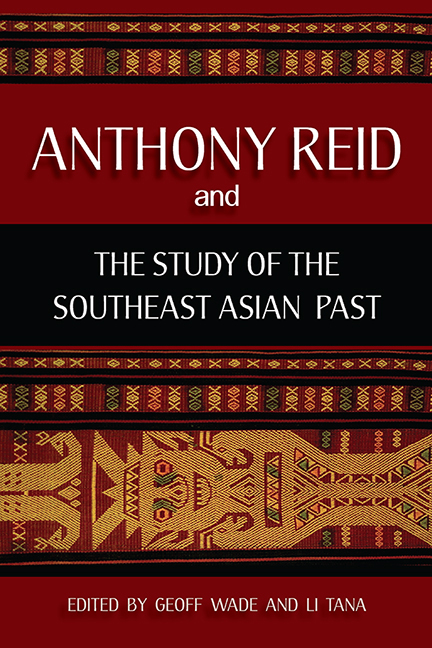Book contents
- Frontmatter
- Contents
- Acknowledgements
- The Contributors
- PART I Introduction
- PART II The Scholarship of Anthony Reid
- PART III Southeast Asia in the World
- 3 Southeast Asia and Eurasia during a Thousand Years
- 4 A Two-Ocean Mediterranean
- 5 The Concepts of Space and Time in the Southeast Asian Archipelago
- 6 Dominion over Palm and Pine: Early Indonesia's Maritime Reach
- PART IV Early Modern Southeast Asia
- PART V Modern Southeast Asia
- Appendix
- Index
- Plate section
5 - The Concepts of Space and Time in the Southeast Asian Archipelago
from PART III - Southeast Asia in the World
Published online by Cambridge University Press: 21 October 2015
- Frontmatter
- Contents
- Acknowledgements
- The Contributors
- PART I Introduction
- PART II The Scholarship of Anthony Reid
- PART III Southeast Asia in the World
- 3 Southeast Asia and Eurasia during a Thousand Years
- 4 A Two-Ocean Mediterranean
- 5 The Concepts of Space and Time in the Southeast Asian Archipelago
- 6 Dominion over Palm and Pine: Early Indonesia's Maritime Reach
- PART IV Early Modern Southeast Asia
- PART V Modern Southeast Asia
- Appendix
- Index
- Plate section
Summary
Our concepts of space and time are highly useful in our daily lives and are, moreover, ingrained in our history. Hence it seems almost impossible for us to understand any phenomenon in our own culture or any other without first defining it by placing and dating it, thereby relating it to other phenomena while at the same time endowing it with its own unique characteristics. This way of thinking goes back far into the past.
The Greeks already had the idea of progression — and history — as well as an autonomous notion of space that was sufficiently developed to allow for both geometry and geography. Subsequently Christianity made an important contribution towards consolidating our idea of linear time by giving a meaning to the life of the individual (through reflecting on its finality) and by tracing the collective adventure of the human race from a starting point at the creation of the world to a conclusion at the Last Judgment. Since the sixteenth century, scientific thought and the ideology of progress have not challenged the primacy of either concept, and while some of Einstein's ideas clearly called them into question, it is obvious that these ideas have been swept along with the encroaching tide of modernity.
We well know — as research has shown — that our Western societies have not always held such definite opinions on this subject. For a long time there were quite complex views about an afterlife, whether in space or time. Where did souls go after death? Whereabouts in space could purgatory be situated? The world was only mapped through a long process of trial and error. Pilgrimages were contemporaneous with voyages of exploration and discovery. Europe too has known the millenarian upheavals that can be seen today in certain countries in the throes of decolonization. Not so long ago in the privacy of our homes makeshift shamans used Ouija boards in their attempts to communicate with the dead, and we know that astrology and numerology still flourish at the very heart of the most developed urban societies. At this point one could simply accept that different conceptual systems can overlap or exist in juxtaposition, but in general we prefer to consider these concepts as ‘residual’ aberrations. In contrast with them, our pure concepts of space and time seem all the more precious and indispensable.
- Type
- Chapter
- Information
- Anthony Reid and the Study of the Southeast Asian Past , pp. 85 - 100Publisher: ISEAS–Yusof Ishak InstitutePrint publication year: 2012

